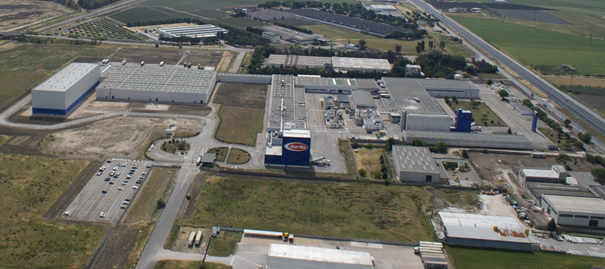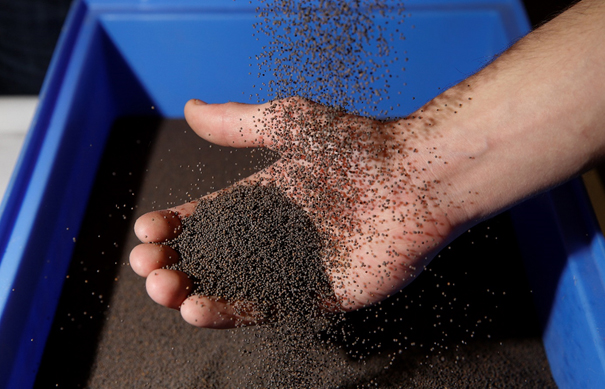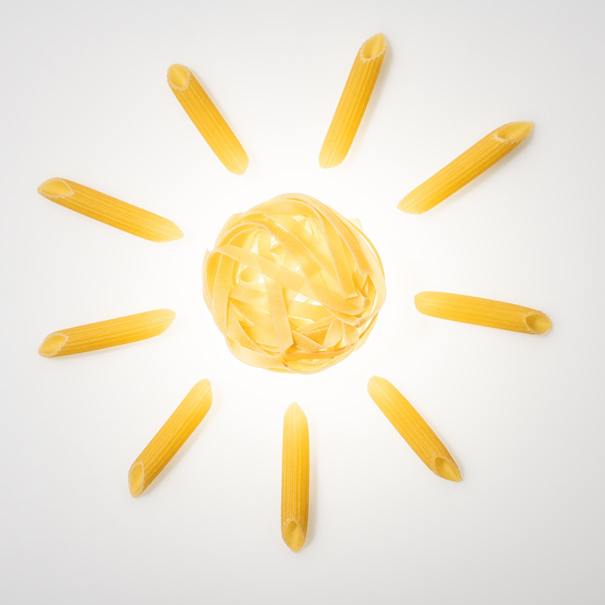Wheat, water, and energy are the ingredients of delicious Italian pasta. In the European HiFlex research project, industrial companies and research institutes from the German Aerospace Center (DLR) are now working together to reduce the CO2-footprint of pasta production. The world’s largest pasta producer Barilla is one of the industrial partners of the project. Near the pasta factory in Foggia, in the south of Italy, a unique energy supply system will be built in the next two years. Barilla will use thermal energy for its pasta production to partly reduce the consumption of fossil fuels. The EU-funded project will demonstrate that it is possible to run a pasta plant 24/7 continuously powering it from renewable sources.
 Eleven partners from the world of research and industry in seven different countries joined their forces for the project to succeed. All of them are experts in their fields: big power plant developers, small and medium-sized enterprises producing highly specialized components as well as research institutions work hand in hand. “The plant will demonstrate technical feasibility and economic viability of this technology,” says Gabriele Bertoni, Project Manager at Kinetics Technology, describing the ambitious goals.
Eleven partners from the world of research and industry in seven different countries joined their forces for the project to succeed. All of them are experts in their fields: big power plant developers, small and medium-sized enterprises producing highly specialized components as well as research institutions work hand in hand. “The plant will demonstrate technical feasibility and economic viability of this technology,” says Gabriele Bertoni, Project Manager at Kinetics Technology, describing the ambitious goals.
At Barilla, the project contributes to the company’s sustainability goals: “It is a set goal for Barilla to make the energy supply and production processes more efficient in order to reduce CO2 emissions. Taking part in this project gives us a chance to test an innovative way to supply our plant with renewable energy.
With this project we are starting to make pasta using the sunlight power”, says Luca Ruini, Barilla’s Vice President – Health, Safety, Environment & Energy, describing the company’s motivation to join the project HiFlex.
Ceramic particles store heat from renewable energy sources and provide it when needed

The starting point for the pilot plant is a solar tower power plant. Around 500 moving mirrors, so-called heliostats, focus sun rays onto a spot at the top of the tower, where a special solar receiver absorbs the bundled solar radiation. One-millimetre ceramic particles are flowing through the receiver. The solar energy heats them to temperatures of up to 1,000 degrees Celsius. This heat energy can be used to generate steam for power production or to produce industrial process heat. The plant can also provide energy at night. Large heat-insulated containers can store the hot particles and pass the heat when needed. Once the particles have released their heat and cooled down, they are transferred to a second tank and then transported back to the receiver and re-heated. The HiFlex project team has a solution for a cloudy day too: “Alternatively, we can heat the particles with renewable wind, solar or biogas,” explains Miriam Ebert from DLR Institute of Solar Research.
The system can be easily adapted to the plant’s energy demand
As the name suggests, one great advantage of the system is its flexibility. It can supply industrial processes with electricity and heat at different temperature levels – completely on a sustainable basis. At the same time, it can stabilize the power grid and compensate fluctuations by storing energy that is not immediately consumed as hot particles and make it available when needed. Storing heat is much cheaper than, for example, storing electricity using batteries. Electricity and heat from renewable resources are subject to daily and weather-related fluctuations. Flexibilization options are therefore extremely important for tomorrow’s energy supply.
A core component of the HiFlex system is its solar receiver. Today’s commercial solar tower plant receivers use molten salt as heat transfer medium. “The HiFlex receiver uses ceramic particles. They can withstand higher temperatures, are inexpensive and pose no danger to the environment. At the same time, they are easier to store and transport than liquid salt, which solidifies when the temperature drops,” explains Miriam Ebert. Developed at DLR, the special receiver has already successfully completed initial tests in DLR’s experimental Juelich Solar Tower. In 2021, the receiver will be delivered to Italy so that the power plant can then go into operation.
This project has received funding from the European Union’s Horizon 2020 research and innovationprogramme under grant agreement No. 857768.
For more information, visit the project website: http://hiflex-project.eu/
Project Partners:
KT – Kinetics Technology is a specialized EPC contractor and part of the Maire Tecnimont Group, a head company of an industrial group leader in natural resources processing industry (plant engineering in oil & gas downstream, with advanced technological and executive skills), listed on the Milan Stock Exchange. In its curhttps://www.kt-met.com/enrent position as EPC Contractor, KT is widely recognized as a company with a strong technological
background and a focus on process design capabilities.
The company roots in its traditional licensing business lines, sulphur recovery and hydrogen production, with multiple relevant units all over the world licensed by KT. Together with Nextchem, KT will coordinate and supervise the project as well as provide engineering for the integration of the same.
NextChem is also part of the Maire Tecnimont Group, operating in the field of green chemistry and technologies for the energy transition, and is part of Maire Tecnimont’s Green Acceleration project. NextChem is managing several technological initiatives to contribute towards energy transition. Thanks to Maire Tecnimont’s leadership in the transformation of natural resources, NextChem can help accelerate the industrialization and commercialization of innovations for sustainably transforming good ideas into industrial plants.
Nextchem, due to its broad experience in pilot plant design as well as in engineering activities in CSP field, oversees the basic engineering and the detailed engineering. Nextchem is also in charge of erection supervision, commissioning and start-up.
German Aerospace Center (DLR)
DLR is the Federal Republic of Germany’s research centre for aeronautics and space. It conducts research and development activities in the fields of aeronautics, space, energy, transport, security and digitalization. DLR uses the expertise of its 55 research institutes and facilities with more than 9000 employees to develop solutions to these challenges.
DLR contributes to the construction and operation of the pilot plant with expertise from three research institutes. Involved in the project are the DLR Institute of Solar Research, responsible for the development of the centrifugal particle receiver and techno-economic assessment of the plant, along with the Institute of Engineering Thermodynamics, which will supply the particle-CFD simulations and validation for the development of the steam generator, while the Institute of Materials Research is in charge of particle development, characterization and optimization.
Barilla is a family company, not listed on the stock exchange, chaired by brothers Guido, Luca and Paolo Barilla. It was founded by their great-grandfather, Pietro Barilla, who opened a bakery in Parma in 1877. Now, Barilla is famous in Italy and throughout the world for the excellence of its food products. With its brands – Barilla, Mulino Bianco, Pan di Stelle, Gran Cereale, Harrys, Pavesi, Wasa, Filiz, Yemina and Vesta, Misko, Voiello and Cucina Barilla – it promotes a tasty, joyful and healthy diet, inspired by the Mediterranean Diet and the Italian lifestyle.
When Pietro opened his store more than 140 years ago, his overriding aim was to make good food. Today, that principle has become Barilla’s way of doing business: “Good for You, Good for the Planet,” a slogan that expresses the daily commitment of the over 8,000 people who work for the company, and of a supply chain that shares its values and passion for quality.
“Good for You” means constantly improving the product offering, encouraging the adoption of healthy lifestyles and facilitating people’s access to food.
“Good for the Planet” means promoting sustainable supply chains and reducing CO2 emissions and water consumption. One of the long-term goal is to change its electricity and heat demand to a sustainable production.
Barilla is the end user of the energy produced by the CSP pre-commercial power plant and will host it next to its pasta manufacturing plant in Foggia, South Italy.
Sugimat S.L. is a Spain-based company specialized in design and manufacturing of heat exchangers for different use in the industry and energy sector. With more than 35 years of experience, Sugimat has supplied hundreds of turnkey plants worldwide fueled with biomass or fossil fuels. With support from John Cockerill, Sugimat is in charge for the manufacturing of the steam generator and the condenser.
Tekfen Engineering is a part of Tekfen Group of Companies. It was founded in 1984 to handle the engineering side of the EPC triangle for turnkey projects to provide effective engineering services. Tekfen Engineering has also been contracted out of the Group in particular because of its experience in industrial plants and infrastructure projects. Since its founding, Tekfen Engineering has developed and diversified considerably as a multi-disciplinary engineering and consultancy company. Tekfen Engineering continues to grow in size and experience and to provide services to complement the operations of Tekfen’s associated companies and of third-party clients.
Tekfen Engineering Company is mainly responsible for the optimization, detailed engineering and manufacturing of heliostats and the heliostat field.
HelioHeat GmbH was founded in July 2017 as a spin-off company from the DLR Institute of Solar Research. Its main technology is the Centrifugal Particle Receiver, a highly innovative component for novel CSP plants with the potential for reduced energy costs. HelioHeat also offers plant developers support in feasibility studies, project development, optimization of the complete plant and basic engineering.
HelioHeat manufactures and delivers the Centrifugal Particle Receiver, the electric and the backup particle heater.
Driven since 1817 by the entrepreneurial spirit and passion for innovation of its founder, the John Cockerill Group develops large-scale technological solutions to meet the needs of its time: preserving natural resources, contributing to greener mobility, producing sustainably, fighting against insecurity and facilitating access to renewable energy. Its contribution consists of services and associated equipment for the sectors of energy, defense, industry, the environment, transport and infrastructures.
John Cockerill is responsible of the Particle Steam Generator basic and detail engineering and will also support Sugimat for the Steam Generator manufacturing.
Quantis is a leading life cycle assessment (LCA) consultancy specialized in supporting companies to measure, understand and manage the environmental impacts of their products, services and operations. Quantis offers cutting-edge services in environmental footprinting, eco-design, sustainable supply chains as well as environmental communication.
Quantis assesses the environmental and integrated sustainability performance of HiFlex concept (including individual components and technology as a whole), compared to alternative energy technologies, by means of a life cycle assessment (LCA) and natural and social capital valuation.
Perfect industrial equipment – this is what Dürmeier GmbH stands for. State-of-the art engineering, perfection in production and assembly. With more than 40 years of experience and reliability under the “Made in Germany” mark, Dürmeier provides equipment for different applications (chemical industry, mining, foundries, steelmaking and recycling). Concept development, design, production and assembly – all these processes take place hand in hand in one company. This allows for perfectly matching to existing conditions and interfaces.
Dürmeier is responsible for design and delivery of the transport system for particles to the top of the tower feeding the Centrifugal Particle Receiver.
Contact (in alphabetical order):
• Barilla
Via Mantova, 166
I-43122 Parma
Att.: Lucia Alfieri
Tel.: +39 0521 264725
E-Mail: Lucia.Alfieri@barilla.com
• Dürmeier
Herrenwiesen 8
D-71165 Vaihingen an der Enz
Att. Thorsten Dürmeier
Tel.: +4970428225-15
E-mail: Thorsten@duermeier.de
• German Aerospace Center (DLR)
Institute of Solar Research, Solar Tower Systems
Pfaffenwaldring 38-40
D-70569 Stuttgart
Att. Miriam Ebert
Tel.: +49 176 31696361
E-Mail: Miriam.Ebert@dlr.de
• HelioHeat
In der Spöck 12
D-77656 Offenburg
Att. Lars Amsbeck
Tel.: +49 179 2036141
E-mail: Lars.Amsbeck@helioheat.de
• John Cockerill
Avenue Greiner, 1
B-4100 Seraing
Att. Antoine Guillick
Tel.: +32 (0) 4 242 62 48
E-Mail: antoine.guillick@johncockerill.com
• KT – Kinetics Technology S.p.A. (Project Coordinator)
Viale Castello della Magliana 27
I-00148 ROMA
Att. Mr. G. Bertoni
Tel.: +39.6.60216647
E-Mail: G.Bertoni@kt-met.it
• NEXTCHEM
Via di Vannina, 88
I-00156 ROMA
Att.: A. Salladini
Tel.: +39.06.93567711
E-Mail: A.Salladini@nextchem.it
• Quantis
Konradstrasse 52
CH-8005 Zürich
Att. Tereza Levova
Tel.: +41 44 5520838
E-mail: tereza.levova@quantis-intl.com
• Sugimat
C/Colada d’Aragó
46930 Quart de Poble
E-Valencia
Att. Sara Costa
Tel.: 34 96 159 72 30
E-mail: technicaldpt@sugimat.com
• Tekfen
Gürsel Mah. Imrahor Cad. Premier Kampüs
Ofis B Blok No:29/B/101
T-34400 Kağıthane, Istanbul
Att. Deniz Akçura
Tel.: +90 212 357 03 03
E-mail: deniz.akcura@tekfen.com.tr

